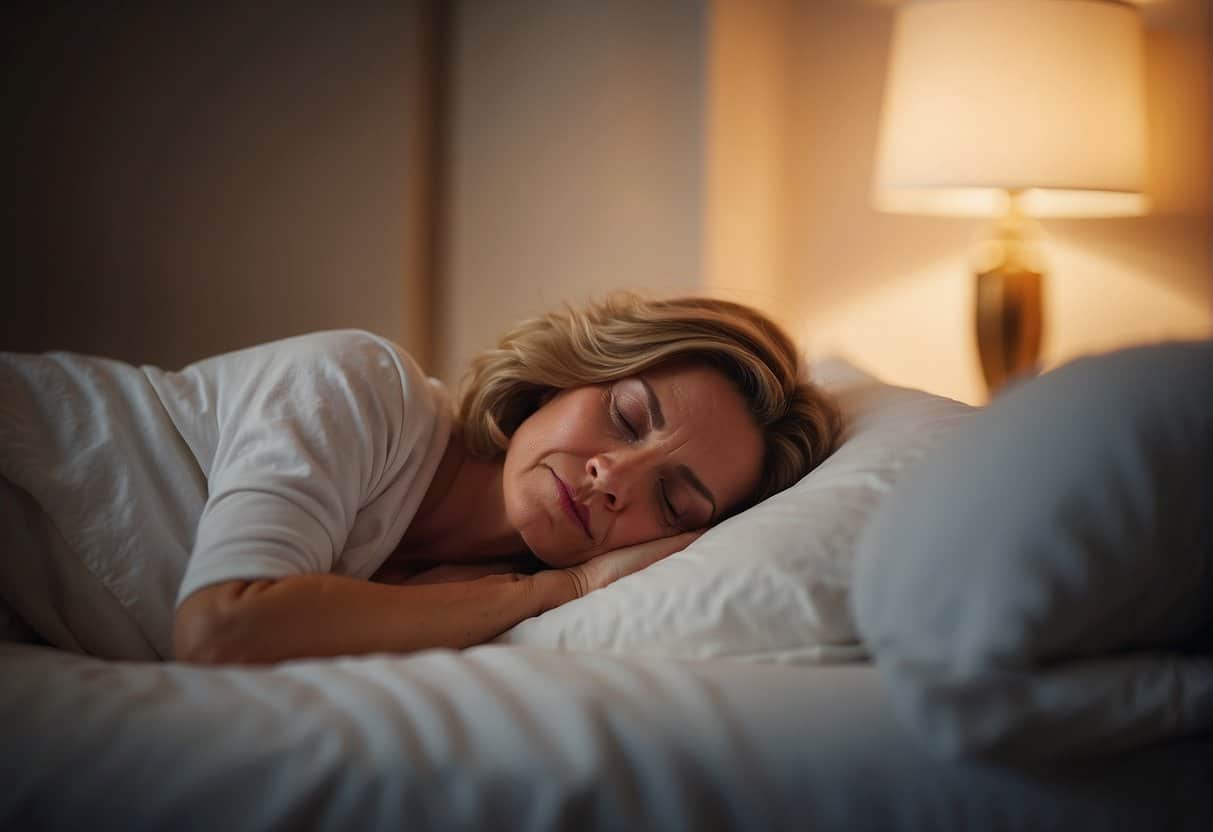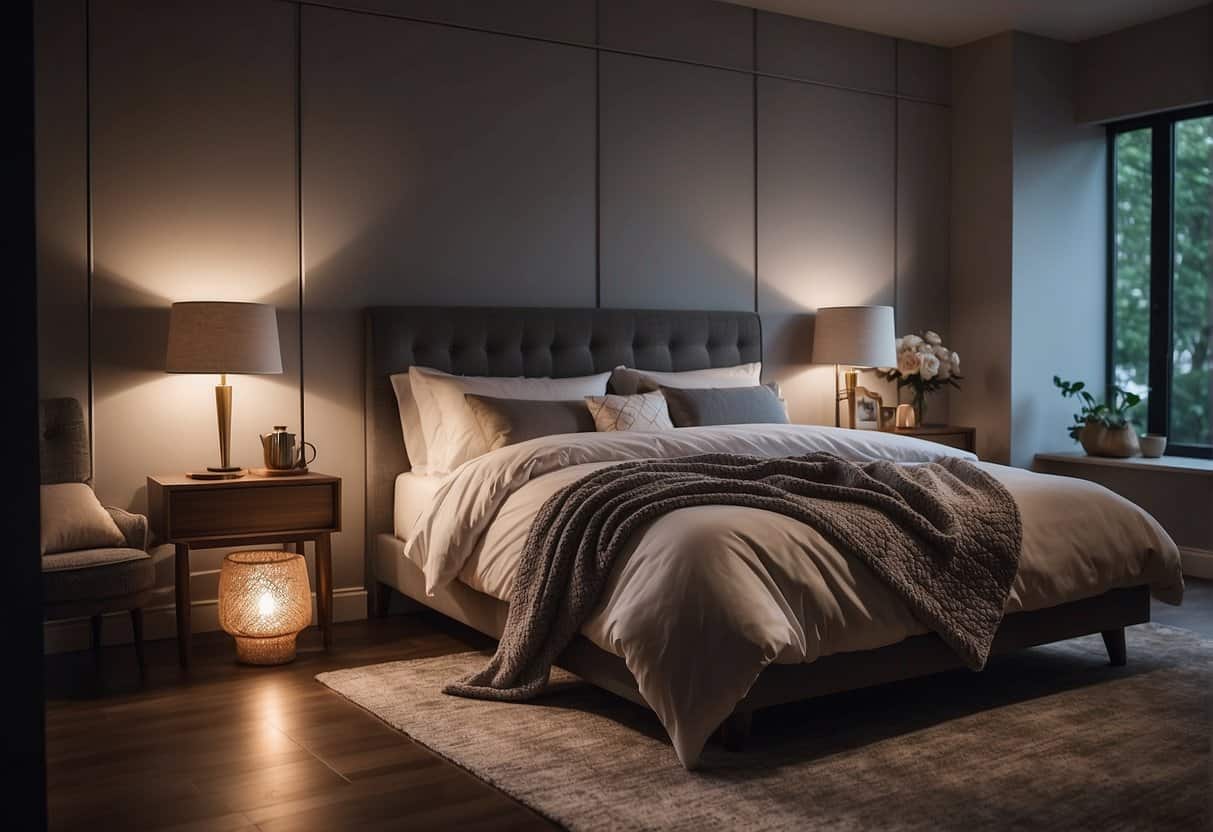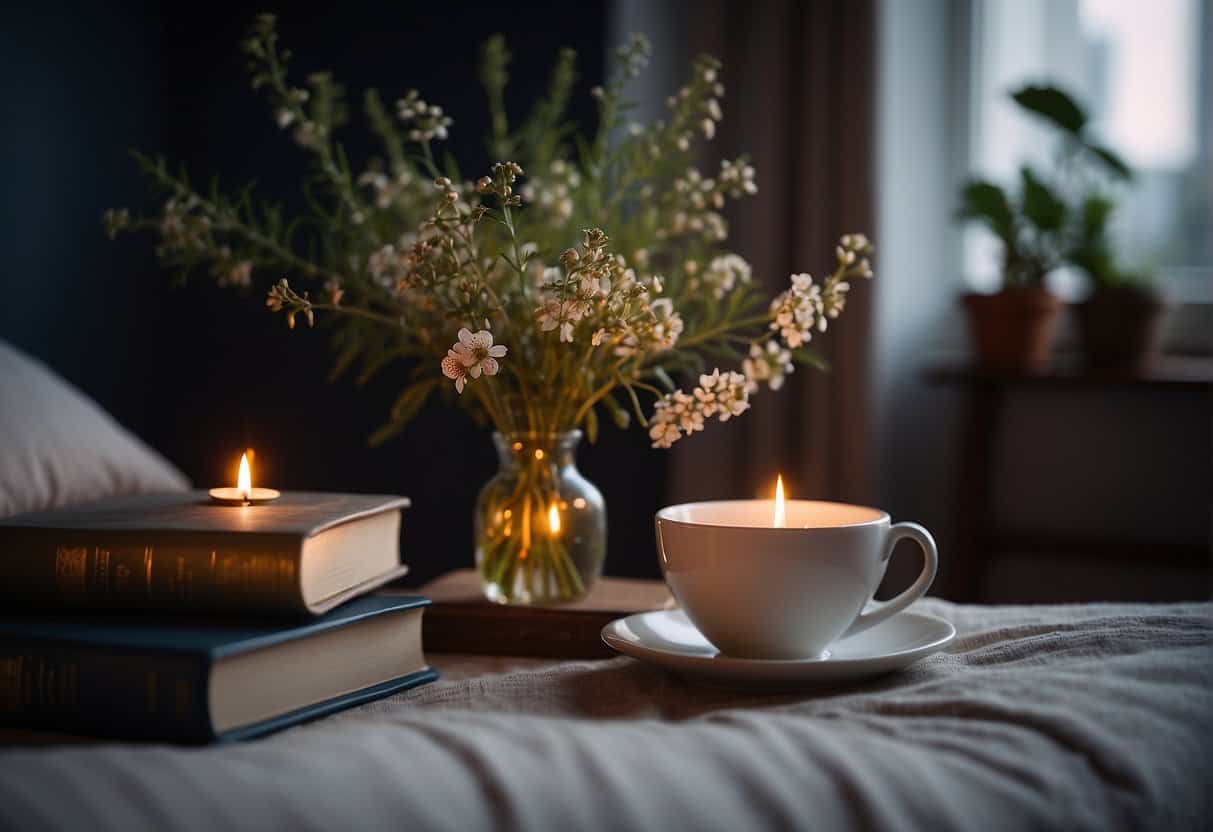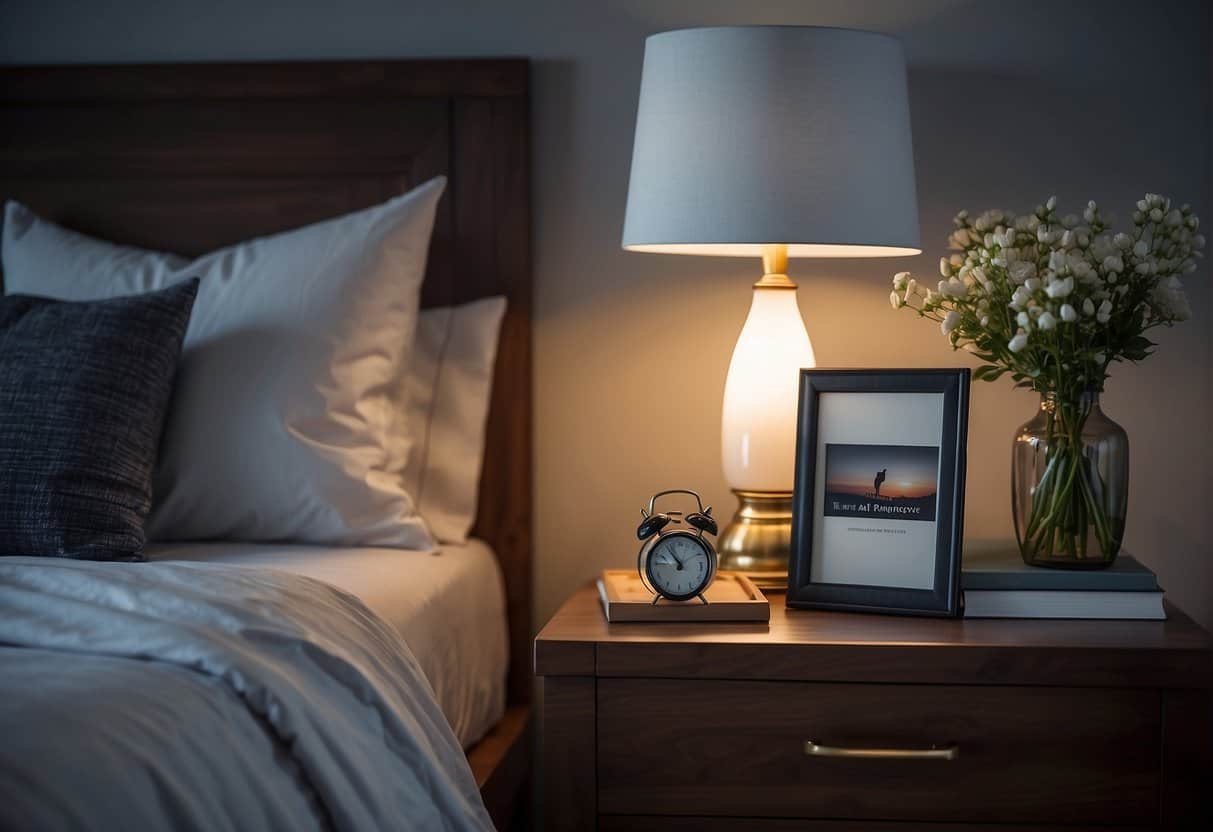The transition into menopause is a significant period in a woman’s life marked by a natural decline in reproductive hormones. As we navigate through perimenopause to menopause, sleep disturbances become a common challenge. Insomnia during menopause is often caused by hot flashes, night sweats, and hormonal changes, which can lead to significant discomfort and a reduction in sleep quality.
Understanding the interplay between menopause and sleep is crucial for addressing sleep-related issues effectively. We recognize the importance of exploring both medical and non-medical strategies to improve sleep. These can range from lifestyle adjustments to seeking professional guidance for symptom management. Our goal is to provide insights into the various ways one can mitigate the impact of menopausal symptoms on sleep, ensuring a more restful and rejuvenating night’s rest.
Key Takeaways
- Menopause can cause sleep disturbances due to symptoms like hot flashes.
- Both lifestyle changes and professional advice are important for managing sleep issues.
- Understanding menopause and proactive strategies are key to better sleep.
Understanding Menopause and Its Impact on Sleep
Menopause marks a significant transition in our lives, often directly influencing our sleep quality and patterns. It involves a range of symptoms and changes to our hormonal landscape, which can lead to various sleep disturbances.
Symptoms and Stages of Menopause
Menopause is the stage of life when our menstrual cycles permanently cease, typically occurring in our 40s or 50s. It’s preceded by perimenopause, where symptoms like hot flashes, night sweats, and mood changes become prevalent. This period also includes postmenopause, the years after menopause has occurred, where some symptoms might persist.
Hormonal Changes and Their Effects on Sleep
The ovaries gradually reduce the production of reproductive hormones such as estrogen and progesterone during menopause. These hormonal changes can result in vasomotor symptoms affecting sleep, such as night sweats that may disrupt our sleep patterns and decrease sleep quality.
Common Sleep Disorders during Menopause
During menopause, we might experience a range of sleep disorders. Chronic insomnia is common, characterized by difficulties falling and staying asleep. Sleep apnea, which leads to intermittent breathing disruptions, may also become more prevalent. Both conditions significantly impact our overall health and daily functioning.
Physiological Connections between Menopause and Sleep
Menopause can alter our sleep architecture. Changes in hormone levels especially estrogen, can modify our sleep cycle, leading to lighter sleep and more frequent awakenings throughout the night. Consequently, we may find ourselves struggling with poor sleep and an increased risk of developing long-term sleep problems.
Through understanding these connections, we can better navigate the challenges of menopause and seek appropriate interventions to maintain good sleep health.
Lifestyle Factors Affecting Sleep Quality in Menopause
We know that menopause can disrupt sleep, but by adjusting lifestyle factors, we can significantly improve sleep quality. Here’s how diet, exercise, stress management, and substance use can influence our rest during menopause.
Diet and Nutrition Influences
Diet plays a crucial role in our sleep patterns, especially during menopause. Consuming a healthy diet with an emphasis on fruits, vegetables, and whole grains can stabilize blood sugar levels and prevent sleep disruptions. It’s best to avoid large meals and spicy foods close to bedtime, as they can cause discomfort and indigestion, leading to poor sleep.
Physical Activity and Its Benefits
Regular exercise, including activities like yoga and walking, enhances our mood and overall mental health. It’s beneficial to engage in moderate physical activity during the day to promote better sleep at night. However, we should avoid rigorous workouts close to bedtime, as they might lead to increased energy levels that can make it harder to fall asleep.
Managing Stress and Anxiety
Menopause can bring about feelings of anxiety and even depression, which in turn affect sleep. We can combat this by practicing relaxation techniques such as mindfulness or deep-breathing exercises. Maintaining our mental health is as vital as our physical wellbeing. Thus, managing daily stress can lead to better sleep.
The Role of Alcohol and Caffeine
Substances like alcohol, caffeine, nicotine, and tobacco can significantly disturb our sleep cycle. Alcohol may seem to help us fall asleep, but it ultimately reduces sleep quality. It’s wise to limit caffeine intake in the afternoon and evening, as it can keep us awake. Similarly, we should avoid nicotine and tobacco, as they are stimulants.
Non-Medical Strategies for Improving Sleep
In our search for better night’s rest, we’ve identified several non-medical strategies that can significantly enhance sleep quality during menopause. These tactics involve refining our sleep hygiene, optimizing our sleep environment, and engaging in relaxation practices.
Sleep Hygiene Practices
Good sleep hygiene involves a set of practices that prepare the body and mind for restful sleep. We can start by setting a consistent sleep schedule, ensuring we go to bed and wake up at the same time every day. This helps regulate our internal clock and stabilize our sleep cycle. It’s important to avoid naps in the late afternoon or evening, as these can hinder our ability to fall asleep at night. Our bedtime routine can include winding down for at least 30 minutes before lights out—activities like reading or listening to soothing music can signal to our body that it’s time to rest.
Environmental Adjustments for Better Sleep
The sleep environment plays a critical role in how well we sleep. We should strive for a bedroom that is dark, quiet, and cool, as a comfortable temperature is key to uninterrupted sleep. Blackout curtains and eye masks can assist in creating the optimal dark setting. White noise machines or earplugs can be used to minimize noise disruptions. Moreover, investing in a comfortable mattress and pillows can make a substantial difference in sleep quality.
Relaxation Techniques and Mental Exercises
Introducing relaxation techniques into our sleep routine can be a powerful sleep aid. Practices such as yoga or cognitive behavioral therapy for insomnia (CBT-I) have been shown to improve sleep patterns. If we’re unsure where to start, a therapist specialized in CBT-I can guide us through specific strategies. Relaxation exercises, like deep breathing or progressive muscle relaxation, can help reduce bedtime anxiety and induce sleepiness. By incorporating these mental exercises into our nightly ritual, we can enhance our overall well-being and encourage a more restful night’s sleep.
Medical Interventions for Menopause-Related Insomnia
Menopause-related insomnia can be challenging, but we have effective medical interventions at our disposal. These include hormone replacement therapy, prescription medications, and over-the-counter solutions, which we’ll explore here.
Hormone Replacement Therapy Options
Hormone Replacement Therapy (HRT) addresses the hormonal imbalances that often contribute to sleep problems during menopause. HRT typically involves estrogen and sometimes progesterone. Estrogen can be administered through a variety of methods such as pills, patches, or gels. It’s crucial to consult with a healthcare professional to personalize HRT based on health history and sleep needs.
Prescription Medications and Their Usage
For some of us, prescription medications may be necessary to manage sleep disturbances. Antidepressants, such as SSRIs or tricyclics, not only alleviate depression but can also improve sleep quality. Benzodiazepines may be prescribed for short-term relief, while gabapentin is sometimes recommended for its off-label benefits in sleep aid. Always take these medications under the guidance of a healthcare professional, such as a psychiatrist, to ensure proper usage and to monitor side effects.
Over-the-Counter Solutions and Supplements
Over-the-counter (OTC) sleep aids and dietary supplements can also assist in improving sleep. Melatonin supplements may help regulate sleep cycles, while magnesium is known for its sleep-enhancing properties. Black cohosh is another supplement that some women find helpful for menopause symptoms and sleep. It’s important to verify that any OTC solution or supplement is FDA-approved and to understand that their efficacy may vary.
Further Considerations for Managing Sleep during Menopause
When addressing sleep issues during menopause, it’s imperative to focus not only on the physical symptoms but also on the holistic experience, including cognitive, psychological, and age-related factors. We understand that menopause can greatly influence sleep quality and overall quality of life, and that’s why these considerations are essential.
Cognitive and Psychological Support
Menopause can lead to mood swings and changes in cognitive function, affecting memory and overall mental health. Engaging in cognitive behavioral therapy has been shown to be beneficial in managing these symptoms and improving sleep. It’s often helpful to consult a healthcare professional or a psychiatrist to personalize this approach and address our specific needs.
Understanding and Monitoring Sleep Patterns
We should closely monitor our sleep patterns, as changes in sleep quality can impact our daily functioning. It’s crucial to establish a consistent sleep schedule and improve sleep hygiene, which can include creating a pre-sleep routine and optimizing the sleep environment. These efforts help in identifying specific issues and tracking improvements over time.
Influence of Aging on Sleep and Menopause
As we age, the interplay between sleep and menopause becomes more pronounced. Aging can lead to a natural decrease in bone density and change in sleep patterns, which may coincide with menopausal transitions. We must recognize these shifts and make proactive adjustments to our lifestyles, such as maintaining a consistent sleep routine and managing stressors, to sustain our quality of life.
Conclusion
We understand that menopause can significantly impact sleep quality, which in turn affects overall quality of life. It’s clear that hormonal changes during menopause can make getting a good night’s sleep challenging. We’ve explored various options to manage these sleep disturbances with the aim of improving sleep during this transition.
- Lifestyle adjustments: Incorporate regular exercise and maintain a cool, comfortable sleep environment. Avoid caffeine and alcohol close to bedtime, as they can exacerbate sleep issues.
- Medical interventions: Discuss with healthcare providers about the possible benefits of selective serotonin reuptake inhibitors (SSRIs) which have been shown to help with menopausal sleep symptoms.
- Alternative remedies: Some women find relief with non-prescription options, ranging from dietary changes to relaxation techniques. It’s important to consult a doctor before trying new remedies.
We emphasize that personal experiences with menopause may vary. We advise women to seek professional guidance when considering menopausal hormone therapy or other sleep aids due to differing individual health profiles.
Our aim has been to empower with knowledge, so informed decisions can be made about managing menopausal symptoms. By addressing these sleep challenges, we strive to improve not just nighttime rest, but also enhance the overall quality of life during menopause.
Frequently Asked Questions
In navigating menopause-related sleep issues, we understand that reliable information is crucial. Here we address some common concerns with practical guidance.
What are effective natural remedies for menopause-related sleep problems?
Natural remedies such as maintaining a cool bedroom environment, reducing caffeine intake, and incorporating relaxation techniques like yoga or meditation can be effective for menopause-related sleep problems.
How can insomnia related to perimenopause be managed?
Insomnia during perimenopause can often be managed by establishing a regular sleep schedule and creating a bedtime routine that promotes relaxation, as recommended by the National Institute on Aging.
Which over-the-counter medications are best for sleep issues during menopause?
Over-the-counter sleep aids containing antihistamines may be used for short-term relief, but it’s crucial to consult with a healthcare provider as these medications can have side effects and interactions with other drugs.
Why do women in menopause frequently wake up early, such as at 4am, and how can this be treated?
Early morning awakenings may be due to hormonal changes, and treatment can include lifestyle adjustments like moderating alcohol consumption and stress management techniques. For severe cases, seeking advice from a medical professional is advised.
What are the long-term effects of menopause on sleep quality, and does this insomnia eventually resolve?
The long-term effects on sleep quality can vary, but many women experience an improvement post-menopause. Sleep strategies and treatment plans can alleviate symptoms, and often, insomnia does improve over time.
Are there specific sleep aids or medications recommended for women undergoing postmenopausal sleep disturbances?
While some sleep aids may be beneficial, it’s essential for postmenopausal women to consult with healthcare providers for individualized recommendations based on their medical history and current health status.






